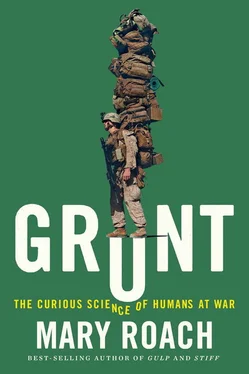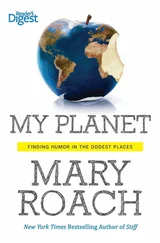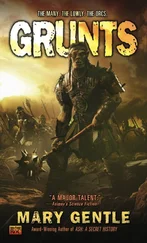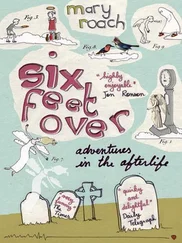Why do these creatures do this to us? Is there an evolutionary motive? Sure, says Riddle. There always is. By causing humans to produce liquid feces, feces that splatter and flow and coat a larger surface area, a pathogen speeds its spread. Cover the world! The bacterium that causes cholera is especially proficient. Cholera patients decant as much as five gallons of liquid a day. The efflux is so torrential that one of Dr. Phillips’s Navy colleagues was inspired to invent the cholera cot, an army-style cot with a hole cut out under the buttocks. (Bucket sold separately.) The cots, still made today, allow patients to “go to the bathroom without leaving the bed,” writes specialneedscots.com, taking euphemism into the realm of quantum physics.
Besides, enteric bacteria are not easily flushed out. They’ve evolved ways to hang on in the deluge. ETEC—the bacteria behind as much as half of all travelers’ diarrhea—are equipped with a hairlike grappling hook called a longus, which they use to pull themselves close to a cell wall. On receipt of a chemoelectrical signal from the cell, the bacteria sprout springy hairs called fimbriae, with suction cups at their ends. Your immune system, for its part, has more sophisticated defenses than simply hosing down the premises. It starts cranking out specially designed antibodies. One might target the suction cups and keep them from adhering. Another might gum up the longus or disable the toxin.
Sergeant Robinson has nothing more to say about diarrhea, but he would like Riddle to have a word with the people responsible for the packet of toilet paper in the combat field rations, or MREs (Meals, Ready-to-Eat). “It’s like this much.” [33] I tried, but I cannot tell you who decided how much toilet paper to include in MREs, or how. But I can tell you a lot of other things about the TP, because I found the federal specifications, ASTM D-3905. I can tell you the required tensile strength, wet and dry. I can tell you the colors it’s allowed to come in (white, dull beige, yellow, green), the minimum grammage and basis weight, the percentage of postconsumer fiber, the required speed of water absorption. And maybe that’s our answer right there. Because if your anus is as securely clamped as the anus of whoever is in charge of “toilet tissue used as a component of operations rations,” ASTM D-3905, you probably don’t need much.
He tears off a piece of napkin the size of a drink ticket. “To wipe your ass!” Riddle volunteers that Navy guys pack baby wipes. He may regret saying this, because Robinson counters that Marines just cut off a piece of their t-shirt. Which possibly sums up the whole Marine Corps–Navy relationship.
Riddle thanks Sergeant Robinson and makes to leave. He likes to get back to his quarters before 8:00 a.m., when the national anthems—first Djiboutian, then American—begin playing over the Camp Lemonnier public address speakers. All those outdoors have to stop what they’re doing and stand respectfully until the music stops. [34] Other bases require this at 4:30 or 5:00 p.m., when the flag is taken in. When the music begins playing, you stop what you’re doing and face the flag. I was at Natick Labs when this happened. Without explanation, my hosts stopped talking, turned, and solemnly faced a display model of a new containerized latrine standing in the sight lines of the flag. Having heard about the horrors of open-bay toileting, it seemed wholly appropriate for us to direct some respect, however unintended, to the Expeditionary Tricon Latrine System.
The Djiboutian national anthem is a melodic, sweeping number, like the theme song to an old TV western. The whole thing isn’t played, but it can seem that way should you be having some “postprandial urgency.” Meals—particularly the big ones occasioned by all-you-can-eat chow-hall buffets—trigger the gastrocolic reflex, a major move-along of the contents of the large intestine. Ushering out dinner to make room for breakfast. If, on top of that, you have a touch of irritable bowel syndrome (IBS), there may be times when all the patriotism in the land won’t keep you standing through the final bars.
During his years at NAMRU-3 headquarters, in Cairo, Riddle regularly got hit with diarrheal infections, a result of “sampling the fecal veneer” at local eateries. Irritable bowel syndrome is a well-documented, little-publicized aftermath of diarrheal infections—especially severe or repeated bouts. If you talk to people who’ve recently been diagnosed with IBS, about a third of them will say that their symptoms began after a bad attack of food poisoning. Defense Department databases reveal a five-fold higher risk of IBS among men and women who suffered an acute diarrheal infection while deployed in the Middle East. Even the Veterans Administration recognizes IBS—as well as a form of arthritis called “reactive”—as one of the “post-infectious sequelae” of enteric infections. If patients can show that the condition developed following an infection with shigella, campylobacter, or salmonella during deployment, they’re entitled to benefits. Riddle estimates that the Defense Department could wind up spending as much money on these long-term consequences of food poisoning as it spends on post-traumatic stress disorder.
Why not prescribe antibiotics more widely? First, there’s the issue of antibiotic-resistant strains developing, though this is less of a concern with some of the newer regimens that wipe out infections in a single day—likely not enough time for a resistant strain to evolve and thrive. More worrisome, perhaps, is recent research showing that the colons of overseas travelers who treat their diarrhea with antibiotics, particularly in Southeast Asia, tend to become colonized with two species of “bad” bacteria that they then carry home and can spread around town. Both bugs may inhabit a traveler’s gut only briefly and cause no problems while they’re there, but they are dangerous to patients with weak immune systems. Here again, with the newer single-dose regimens, it may not be an issue.
These are largely first-world concerns. The week I returned from Djibouti, the World Health Organization released a statistic for annual deaths from diarrhea worldwide: 2.2 million. The estimate for ETEC alone is 380,000 to 500,000 deaths per year. Children especially are at risk because they dehydrate dangerously fast. The Centers for Disease Control and Prevention puts the daily toll for deaths from diarrhea in children under five at 2,195—more than from malaria, AIDS, and measles combined. (The Gates Foundation is funding the Navy’s efforts to develop an ETEC vaccine.)
Riddle traveled a lot in his twenties and recalls being hit by a realization. So much of people’s lives—their opportunities, their health and longevity—comes down to where they were born. “It’s so random,” he says. We’re over at his office, which is downstairs from his lab, in the same container. “It shouldn’t be that way. It shouldn’t matter where your parents happened to live.” He pauses for a jet ripping through a takeoff. At certain times of day, you get this every few minutes. It’s like having a desk under the tarmac at Heathrow. The commotion fades and Riddle resumes. “I went into medicine wanting to help the greatest number of people.” And then, just when I thought he’d gone all earnest on me: “I happened to fall into diarrhea.”
AT CAMP Lemonnier there is often a quicker route to where you’re going, but to follow it you’d need to be shot. You’d need to scale a twelve-foot-high Cyclone fence and the barbed-wire Slinky along top of it, ignore the sign—Stop! Deadly Force Authorized!—and cross into the secure zone. Camp Lemonnier is the hub of counter-extremism activities in north Africa and Yemen. A fleet of drones resides in the zone, along with Navy SEALs and other Special Operations ghosts who pass in and out on their way from one classified gig to the next.
Читать дальше












